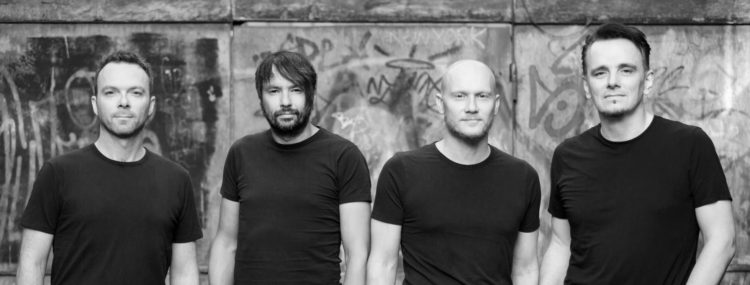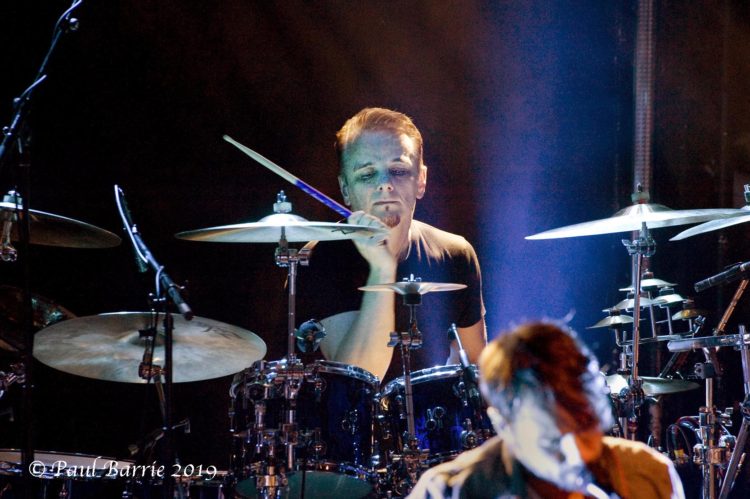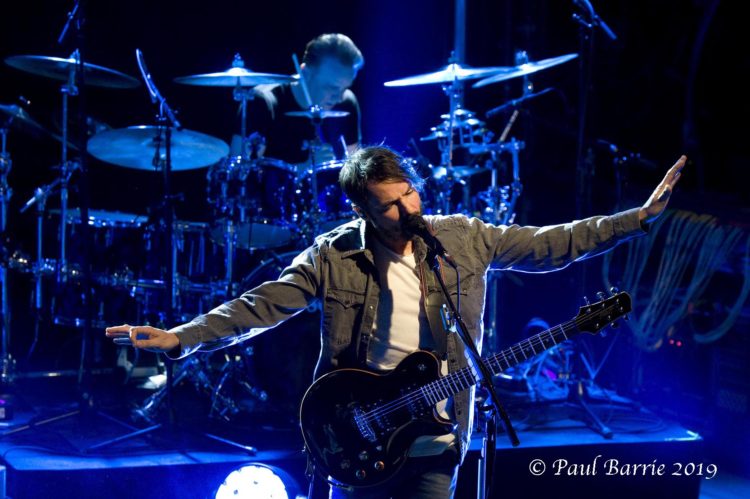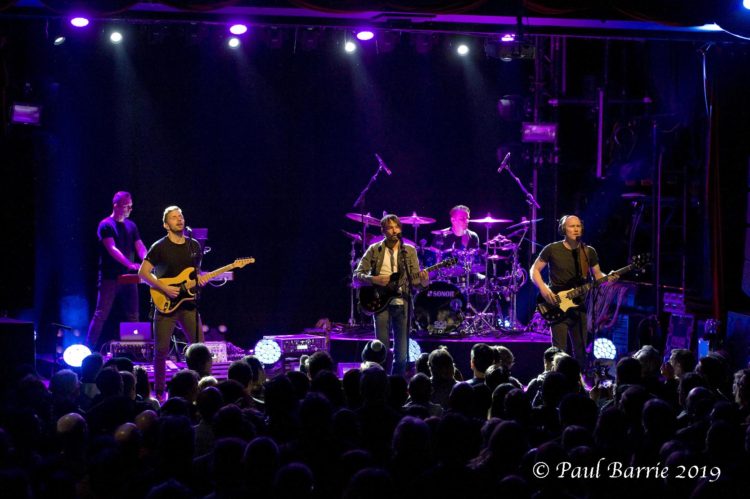
Prior to their show at the Mod Club in Toronto on November 28th, Music Life Magazine’s Kevin Barrie interviewed Bruce Soord (lead guitar and vocals) and Gavin Harrison (drums) of The Pineapple Thief. The interview took place in their dressing room at the venue, and they discussed their first North American tour, Gavin’s contributions to the band, and the state of Prog rock, among other things.
KEVIN: My understanding is that this is your first venture into North America, in particular Canada, aside from playing festivals. Is that correct?
BRUCE: Well it’s certainly the first headline tour for The Pineapple Thief. We did play some prog festivals in the USA. We also played a very small gig, one-of(f) sort of weekend festival in Quebec, literally a hundred and twenty people. So it was very small. That was a long time ago. So, yeah, it’s our very first time. Gavin’s obviously been many times – so he’d have lots of stories of being in Porcupine Tree and how they built (&) worked the market, built themselves up – so, a bit of insider knowledge.
KEVIN: So what would say is your impression of North American audiences vs. British or European audiences?
BRUCE: We talk about this because we have these, sort of, VIP meet and greets before the gigs. So we discuss this…A common question is “What is it like – the audiences here?” I think they’re brilliant, actually – you know, they’re really electric. As a frontman, you can really feel the energy from the crowd. Canada especially – Montreal yesterday was just….they were singing, cheering, sort of like football songs in between songs. As a frontman it makes you feel very good. And some European audiences can be much more discerning, listening audiences, so…It’s a different energy than what we’re used to.
GAVIN: Yeah, they were singing a lot – not our songs, weirdly! [Bruce laughs] That was bizarre!
BRUCE: Yeah! What were they singing? There was like…. [sings a football chant tune]
GAVIN: A football chant.
BRUCE: [sings a football chant tune] In between songs – yeah, it makes you feel good.
KEVIN: As you come here, do you find that people are familiar with your back catalogue or your new material mostly?
BRUCE: There was certainly an upward curve when Gavin came on board for Your Wilderness. And then when Your Wilderness came out there was a big upsurge of people sort of discovering [us]…”Oh here’s this band” – even though we’d been around a long time, we were very much underground. And then that kind of enabled us to poke our head [out]…Obviously you’ve got to have the songs, you’ve got to have the product, but I think that’s when most people came on. Certainly we know from the trajectory – the fact that we’re able to do a North American tour says it all really.
KEVIN: Gavin, you’ve recently joined the band. So what was it that appealed to you from the music? I understand you were approached by a record label (Kscope) – so obviously something must have appealed to you about The Pineapple Thief. What was it, do you think?

GAVIN: I didn’t like the music – I just wanted the money [Bruce and Gavin laugh]. No, I get asked to play on a number of projects and in the last ten [or] fifteen years I only take on projects that I like the sound of and that I feel I can connect with the music and make a meaningful contribution to. So, in the days of the internet as we are, people send me their demos [and] sometimes I don’t feel I could make a good contribution to it. Sometimes I think ‘Well, maybe I could’, and sometimes I think ‘Oh wow, this is really good!” And Bruce was in the first category of I couldn’t really connect with it. No! I’m joking.
As soon as I heard the first song which was a song called Final Thing on My Mind I thought ‘oh, this is great! I really really like this.’ I’ve been looking for a home – a collaborative home that I could reconnect with and be involved in. So it was a good discovery for me.
When I played on Your Wilderness I was sort of employed as a session drummer, but I don’t really do the session drummer thing anymore – it’s a much more collaborative process. We got on really well and then actually me and Bruce wrote a couple of songs after that for some other project, and we thought ‘Maybe we’ll do that one together’. Then when it came time for the second record, Dissolution [sic] we actually used the two songs that we’d written before. Yeah, it’s been a great, great process for me.
BRUCE: Even though Your Wilderness was, really, on paper, paid per session, I don’t know if you remember, there was a lot of [time] when we sort of got to know each other over the phone. It was like, ‘Actually, Bruce, how about we chop this down and this bit that goes on in 4/4 the way through, let’s try doing this and that [or] do you mind if we do this’ and I was like ‘Yeah! Let’s do that!’
Tear You Up – the opening song of the [live] set, actually – It was getting to the deadline and I was like ‘oh god, we haven’t got an album.” And so Gavin says ‘I’ve got half a song and I don’t know where I’m gonna go next.’ So Gavin says ‘How about we just do this’ and he just drums and grooves and then I was like ‘Yeah, that’s great.’ From day one it was a collaborative effort
– it changed the music and changed the songs.
KEVIN: And have you found that it’s brought out more in the other band members who’ve been with the band a long time?
BRUCE: Oh absolutely – yeah, yeah. I mean, [if] you speak to Jon [Sykes] the bass player, he’s very happy. If you haven’t got an inspiring drum part, then where do you go? Everything really feeds off that.
KEVIN: Could you talk about developing a live show – now that you’re touring, you [Bruce] have quit your day job to focus on this full time. How do you approach this?
BRUCE: Well I mean Gavin’s been full time since he dropped out of school and ditched with his drum kit!
GAVIN: That and the window cleaning…it’s been tough. [both laugh]
BRUCE: I guess just about when Your Wilderness came out is when I was able to ditch the 9 to 5. Before that, running a band, you’re in a very privileged position if you make money out of being in a band.
KEVIN: What kind of 9-to-5 were you working?
BRUCE: Oh, it was IT/office stuff. But it enabled me – when I switched off [at the end of the day], to just go home and I was so desperate to do something creative, so I can’t complain about it, because it allowed me to do both things. But it did put a lot of pressure on your personal life, your family life, because when you should be spending time with your family I’d be in the studio. So when I was able to devote all of my time, really, to music – in the early days I had to do mixing and production for other bands, but now, the band’s getting so busy that it’s almost like a full-time job now.
KEVIN: But you still are mixing and producing?
BRUCE: Yeah, but not as much as I used to.
KEVIN: But for the Pineapple Thief albums? That’s more of a personal decision?
BRUCE: Yes, well, we definitely keep that all in house. We’re lucky that when we do albums that Gavin’s got a really nice drum room.
KEVIN: You [Gavin] have a barn of some sort?
GAVIN: Yeah, I’ve got like this – I don’t know how to describe it – I’ve got, sort of like a church hall in the middle of my house.
KEVIN: Not many people have that –
GAVIN: No, not – especially if they’re not religious. And so, it’s like the perfect reverb for drums, this room, and it really makes a massive difference. Rather than kind of recording it in a bedroom and sticking on fake digital reverbs, it’s really another level of tone and audio hi-fi that you can hear real reverb – real drums in a real room. You hear so many records that are kind of faked with samples and digital manipulation. When you put them side by side you actually really hear a big difference.
BRUCE: So we’re very lucky. So when we mix a record, Gavin just mixes the drums, and sends me a stereo mix of the drums. The drum mix is the hardest part, I think, of mixing a rock song. So I mix the rest and once I’ve mixed it Gavin will tweak his drums and send it backwards and forwards.
So I’ve got my studio, Steve [Kitch, keyboard player] actually runs a mastering business, so he’s got a mastering studio. So it’s complete in-house operations, making the albums, apart from our time – it’s not that we have to spend tens of thousands of pounds camping in a recording studio because we’ve literally got the same quality in our own places. So yeah. It’s a nice place to be nowadays.
KEVIN: The term “prog rock” has been thrown around a long time. A lot of other artists in the same sphere as you guys struggle with using the term as it can conjure up images of old dinosaur bands. What are your thoughts on the term being used to describe your music?

BRUCE: It’s difficult – it’s very difficult. I can’t criticize the progressive rock community music because we wouldn’t be here without that. It’s such a vibrant community – they seek out music, and they are very discerning. The thing about the prog label is it’s such a broad, broad category. So at one of the spectrum you’ll have bands like Dream Theater, Spock’s Beard, Neal Morse – all that kind of stuff that’s very different to what we’re doing, but we’re still in the same kind of prog category. So if someone says ‘Oh, you’re prog’, ‘Yeah, but we’re not like Dream Theater.’ Not that we hate Dream Theater, but we don’t make music like that. So it’s sometimes quite difficult to just have that alone, just say yeah, we’re a progressive rock band because we’re not. We’re a rock band but we’ve got progressive influences.
For me , it’s really just about songs, about melody, about touching people. And if that means a song can on for a bit longer and go in different directions then that’s fine. And I think that’s the progressive element for me. But, you’re right – it’s not such a dirty word anymore. I think the genre is quite in a healthy state. I don’t think anyone now just immediately pictures capes, and druids, and Stonehenge – all that kind of stuff. It’s very different.
KEVIN: Over time I think a lot of the newer bands are more associated with the term –
BRUCE: Yeah, a pile of these quite strange bands…I mean I grew up loving 70s prog rock. You know I loved Camel and Yes and all that kind of stuff. I mean, Steve [Kitch, keyboardist, sitting across from Bruce] was never into prog rock. [Looking at Steve] You were more of the dance, sort of electronic kind of influences. [Steve nods his head in affirmation] Jon, the bass player, was very much more of a jazz [influenced musician]. Gavin, you didn’t grow up with prog rock, did you?
GAVIN: Well, funny enough, I did play in a band called Renaissance in the early eighties. But, not really…I wasn’t trying to get involved in progressive rock. Because I had quite a detailed education in music that I could read and I could write, come 1983 when I was broke and looking for work, I found a band that were auditioning drummers, and they sent me a cassette – if anyone can remember what they are. And I just wrote out all the charts, all the odd times, all that sort of stuff, and I came to the audition and I could play all the songs. They said, ‘Wow!
You’re the first drummer that actually made it through this song.’ I just had a sort of professional education, because my father was a professional musician. So, you know, it’s quite common that young drummers maybe don’t read music, but I’d had that education. So, I got the job purely on the technicality that I could play it.
But, you know, I don’t really like genre labelling very much. Genre is a perfect excuse for someone to ignore your life’s work. And of course, being in King Crimson, too, I know Robert Fripp [guitarist and founder of King Crimson] hates the idea of prog rock…[he says] ‘It was never called prog rock. We were just a rock band and we did what we thought was the right thing.’ You know, they did adventurous arrangements [but] it wasn’t ‘till about the late eighties that someone came up with the term prog rock.

BRUCE: that ain’t right, wasn’t it not –
GAVIN: [lightheartedly] No no no no no! It was late eighties when some journalist decided ‘Oh! All those bands – late sixties bands, the Pink Floyd and Genesis and Yes, King Crimson’ – rock bands that had imaginative arrangements in their songs, they weren’t doing three minutes pop songs, like Dave Clark Five or something. They were doing more elaborate [songs]. And then someone said well ‘why don’t we just call all that prog – progressive rock.’ And as Robert Fripp would tell you, the last thing a prog rock audience want you to do, is actually progress. What they really want you to do is play your bloody old hits from 1969. So, he hates the term because it was never that label to start with. They were guys who grew up with jazz influence, and with rock and roll influence – you know, real old rock and roll – Bill Bailey stuff. Proper old rock and roll and Elvis Presley, and the early rock bands. Pop bands like the Beatles. People don’t call the Beatles progressive rock, do they?
BRUCE: No, although Sgt. Pepper [sic] and Abbey Road are real proggy albums.
GAVIN: Exactly! So that the start of bands were ‘Let’s just do imaginative arrangements. Forget this three minute format – intro, verse, bridge, chorus, that sort of thing. And let’s just go on our own way.’ I think that’s the way I feel about it. I’m never conscious that it’s prog or even want to be labelled as anything, actually. I don’t want to be labelled as jazz or rock or fusion or anything else. It’s just music to me.
BRUCE: [Looking at Kevin] But as a journalist, it’s got to be difficult hasn’t it. When you’re trying to say, ‘Here’s this band, you might not have heard of them. What are you going to say….
KEVIN: Yeah – I’ve interviewed people like Steve Hackett or Steven Wilson. It’s hard when you’re writing about them and they’ve explicitly stated that they don’t like the term or being labeled it, and yet because they are constantly labeled with the term, it’s difficult to avoid. So you’re writing an article labeling them ‘prog’ even if they’ve personally told you they don’t like it.
BRUCE: Yeah! [laughs]
KEVIN: How would you summarize the main message of the new album Dissolution
especially as it relates to technology? Is there a message?
BRUCE: Lyrically my main message has always been about treasuring the relationships you’ve got in life. And all these challenges that come around that I sing about – you know, like the technological challenges that are sort of affecting society and splitting up people and changing them, is it making people happier – at the end of the day, it’s still about people and relationships.
So the next album that we’re currently writing just carries on that theme. I mean, you know what’s going in the UK with Brexit and similar things happening politically globally – we’re living in quite strange times. The whole concept of whether we can believe anything and how there can be multiple versions of the truth and all that kind of thing that is changing the world that we live in. And it’s affecting people I know and my children, and so again, it’s that kind of environment that ultimately is still songs about, you know, love songs, songs about people I care about. So ultimately it just still boils down to that one thing. That’s what’s feeding into how the songs come in together.
KEVIN: And is the next album coming out 2020-ish?
GAVIN: Oh yeah!
BRUCE: We’re quite a long way through. In fact, we’re trying to find time on the bus to play through all the demos so that when we get back from the tour we’re gonna be straight back into our studios.
GAVIN: Recording it properly.
KEVIN: Thank you!
Connect with The Pineapple Thief online: Facebook Website Twitter
Connect with Bruce Soord online: Website Facebook
